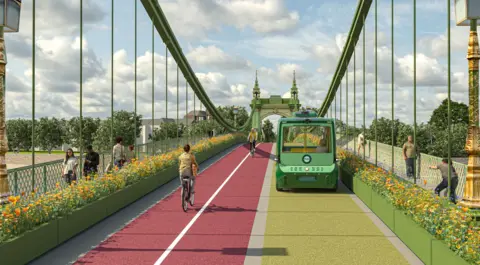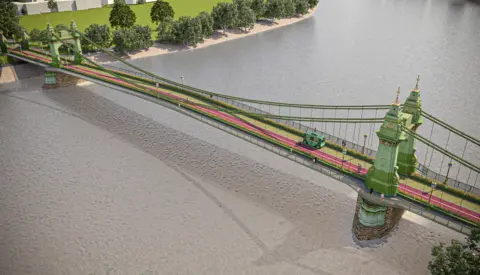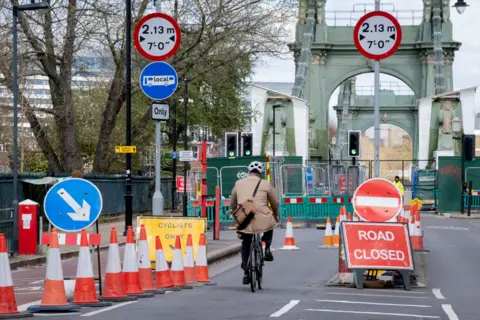Hammersmith Bridge should not reopen to cars - charity
 Possible
Possible- The climate charity Possible says Hammersmith Bridge should remain closed to all motor vehicles, and electric pods should be introduced for people with mobility difficulties
- The plan would cost £10m, Possible says
- The 136-year-old cast-iron structure has been closed to motor vehicles since cracks appeared in the pedestals in 2019
- The local council wants to fully repair the bridge and charge drivers to use it
Hammersmith Bridge should remain closed to cars, with electric driverless pods introduced for people with mobility difficulties, according to an environmental organisation.
This would cost a fraction of the funds needed to fully reopen the major bridge over the River Thames in west London, the charity Possible said.
The 136-year-old cast-iron structure has been closed to motor vehicles since cracks appeared in the pedestals in 2019, leading to longer journeys for many people.
The London Borough of Hammersmith & Fulham (LBHF), which owns the crossing, has proposed fully reopening the bridge and restoring it to its “original Victorian splendour”, which it says could cost at least £160m.
 Possible
PossiblePlans to repair the bridge have so far been delayed by funding difficulties.
The plan published by Possible would see a a two-way protected cycle lane running across the bridge adjacent to autonomous pods available for people who cannot easily walk or cycle.
There would also be paths for pedestrians.
The solution is designed to work within the "existing engineering constraints" of the bridge, meaning only one of the fleet of 10 pods would be permitted to cross at any time.
The total scheme would cost less than £10m, Possible said. The charity said it believed traffic in the area had fallen since the bridge closed.
 Getty Images
Getty ImagesLeo Murray, a co-director at the charity, said: "Our proposal looks to the clean transport technologies of the future, and could genuinely be in operation serving local communities within months.
"All we need to go ahead is for the councils to agree to let us carry out a full feasibility study."
Stabilisation work to make the bridge permanently safe for walking and cycling is due to be completed in the coming weeks.
LBHF said its proposals to repair the crossing must be approved by neighbouring Richmond Council and Historic England before they can progress.
The council plans to introduce a toll to pay for its share of fixing the bridge.

Follow BBC London on Facebook, Twitter and Instagram. Send your story ideas to [email protected]
